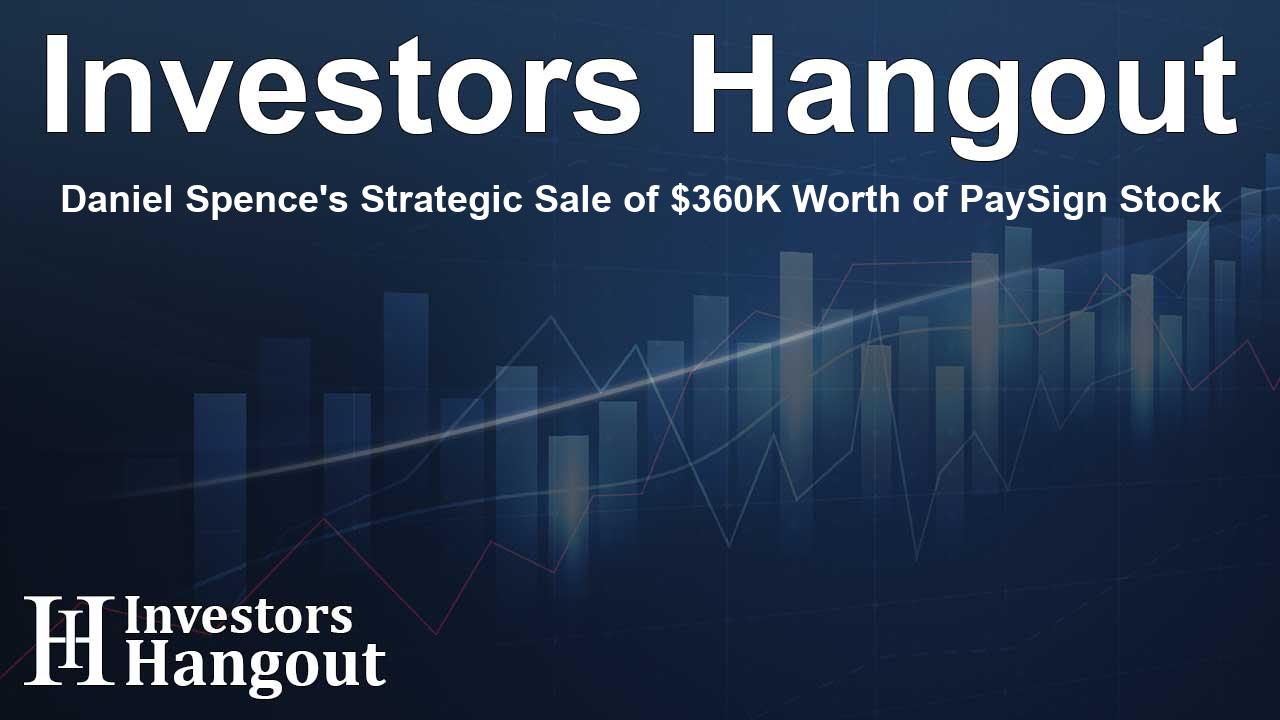Daniel Spence's Strategic Sale of $360K Worth of PaySign Stock

Overview of Daniel Spence's Share Sale
Recently, a notable insider transaction was announced involving Daniel Spence, who holds a 10% stake in PaySign (NASDAQ: PAYS). Spence executed the sale of 100,000 shares of the company, resulting in a transaction valued at approximately $360,500. This sale was documented in a Form 4 filing submitted to regulatory bodies, bringing significant attention to the trading activity.
Current Status of PaySign Stock
As of the latest market update, shares of PaySign were priced at $3.67, reflecting a minimal change of 0.0%. Understanding stock price movements is essential for investors, especially when combined with insights from insider trades.
Exploring PaySign's Business Model
PaySign Inc specializes in offering prepaid card solutions alongside integrated payment processing services tailored for various sectors including healthcare, retail, and hospitality. The company innovates payment solutions that cater to the unique needs of businesses and government entities alike, enabling them to improve their payment efficiency.
An Examination of PaySign's Financial Performance
Revenue Trends: Notably, PaySign demonstrated impressive financial growth, achieving a revenue growth rate of 29.8% as reported by the end of June. This surpasses many competitors within the Financial sector and signifies robust demand for the company’s offerings.
A Closer Look at Earnings:
Gross Margin: The company boasts a gross margin of 52.93%, indicative of effective cost management strategies that enhance profitability.
Earnings per Share (EPS): Currently, PaySign's EPS sits at 0.01, which is below the industry average and may raise concerns regarding earning sustainability.
Debt Management: Maintaining a conservative approach, PaySign’s debt-to-equity ratio is recorded at 0.12, which is favorable relative to its industry peers, reflecting sound financial health.
Valuation Metrics:
Price to Earnings (P/E) Ratio: The firm’s P/E ratio is 24.43, suggesting the stock is valued lower than other firms in its sector, potentially making it an attractive investment opportunity.
Price to Sales (P/S) Ratio: PaySign’s P/S ratio of 3.81 indicates a perception of overvaluation compared to its revenue generation.
Enterprise Value to EBITDA: The company’s EV/EBITDA of 27.58 reflects a valuation that is higher than many competitors in the market.
Market Capitalization Insights: Despite its significant revenue growth, the market capitalization of PaySign suggests a smaller company size compared to others in the sector, which can result from perceived growth potential or operational efficiency issues.
The Importance of Insider Transactions
Understanding insider transactions is crucial for investors assessing company stability and potential growth. Although these activities are not the sole indicator of stock performance, they can influence decision-making processes significantly.
According to regulatory definitions, insiders include high-level executives and anyone owning over 10% of company securities. Notably, these individuals must file disclosures like Form 4 within two business days post-transaction, granting transparency into their trading activities.
A new purchase by an insider can signal confidence in the company’s future prospects. Conversely, a sale may not necessarily indicate negative sentiment but could be influenced by several factors including financial planning needs or diversification.
Analyzing Transaction Codes
Investors observing these transactions should note the specifics signified in Form 4 filings. A purchase is marked with a P while a sale is identified by an S. Other codes, such as C for option conversions and A for awards or grants, provide additional context regarding the nature of the transactions.
Conclusion: Staying Informed on PaySign
As always, alongside staying informed about stock movements and insider activities, understanding the core fundamentals of a company, such as that of PaySign, aids investors in making better-informed decisions. Keeping track of financial reports, insider transactions, and market trends equips investors with the necessary insights to navigate the ever-evolving financial landscape effectively.
Frequently Asked Questions
What prompted Daniel Spence to sell his PaySign shares?
Insider sales can occur for various reasons, including personal financial planning, tax obligations, or portfolio diversification, rather than an indication of negative outlook.
How does PaySign generate its revenue?
The company earns income through prepaid card servicing, transaction fees, and various banking solutions catered to clients across different industries.
What is the significance of insider selling?
While insider selling may raise concerns, it does not always point to negative future performance and can be part of normal financial management by insiders.
How does PaySign's growth compare to its competitors?
PaySign has showcased strong growth rates compared to industry averages, particularly within the Financial sector, indicating robust operational performance.
What is the current outlook for PaySign's stock?
PaySign's growth metrics and insider activity suggest a vigilant investment atmosphere, warranting further observation of upcoming earnings reports and market developments.
About Investors Hangout
Investors Hangout is a leading online stock forum for financial discussion and learning, offering a wide range of free tools and resources. It draws in traders of all levels, who exchange market knowledge, investigate trading tactics, and keep an eye on industry developments in real time. Featuring financial articles, stock message boards, quotes, charts, company profiles, and live news updates. Through cooperative learning and a wealth of informational resources, it helps users from novices creating their first portfolios to experts honing their techniques. Join Investors Hangout today: https://investorshangout.com/
Disclaimer: The content of this article is solely for general informational purposes only; it does not represent legal, financial, or investment advice. Investors Hangout does not offer financial advice; the author is not a licensed financial advisor. Consult a qualified advisor before making any financial or investment decisions based on this article. The author's interpretation of publicly available data shapes the opinions presented here; as a result, they should not be taken as advice to purchase, sell, or hold any securities mentioned or any other investments. The author does not guarantee the accuracy, completeness, or timeliness of any material, providing it "as is." Information and market conditions may change; past performance is not indicative of future outcomes. If any of the material offered here is inaccurate, please contact us for corrections.